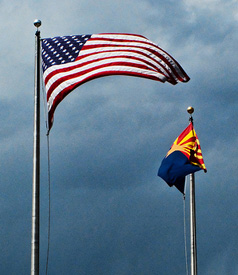Support justice-driven, accurate and transparent news — make a quick donation to Truthout today!
Phoenix – “What’s the matter with Arizona?” is the obvious question about the state’s new immigration law. There are a few obvious answers — and a not-so-obvious one that I was surprised to hear from observers across the political spectrum here.
Obviously, the state is reacting — overreacting — in understandable frustration to the federal government’s failure to control illegal immigration. Overall illegal immigration is down, but stepped-up enforcement in California and Texas has helped shift the problem to Arizona.
Obviously, the state is reacting to an economic crisis that has made the additional pressures of illegal immigration all the more untenable. In the percentage of jobs lost, Arizona has suffered more than Michigan, and its budget woes have exceeded those of California.
Obviously, the Republican Party, which controls both houses of the Arizona Legislature and the governorship, is becoming more conservative nationwide. In the Grand Canyon state, the tea partiers met the minutemen.
But Arizona is not quite as blazingly red as it once was. Arizonans voted for Bill Clinton in 1996 and twice elected Janet Napolitano governor. Five of its eight U.S. House members are Democrats. Its Hispanic population is 30 percent and growing — suggesting that a wise politician of either party would do well not to alienate this key constituency.
Which leads to the less obvious reason that many people here posed as an explanation, at least in part, for the immigration bill: the state’s 1998 “Clean Elections” law. The measure, adopted in response to a corruption scandal, is one of the most far reaching public financing laws in the nation.
Candidates for the Legislature can receive public funding if they collect 220 contributions of at least $5 each. This entitles them to more than $14,000 for the primary campaign and more than $21,000 for the general election. If a competing candidate chooses not to comply with spending and contribution limits, the publicly funded candidate gets matching funds to stay even.
One admirable notion underlying the law was to make campaigns more competitive, leveling the playing field between entrenched incumbents beholden to moneyed interests and upstart challengers otherwise unable to amass the necessary resources.
Trouble is, it worked — perhaps too well. The barriers to entry were extremely low. People with little experience in politics at any level ran for the Legislature and won. Previously, for better or worse, candidates of both parties were “vetted” by business groups who then proceeded to help them raise money, a process that served to filter out extremes on both sides.
And, as it turned out, a law pushed by “good government” types, primarily Democrats, ended up benefiting conservative Republicans who quickly figured out that the Clean Elections money could be used to take on Chamber of Commerce-type Republicans.
“Clean Elections allowed individuals … not to have to compete financially since they didn’t have to build constituencies,” Phoenix Mayor Phil Gordon, a Democrat, said in an interview.
J.D. Hayworth, the conservative former congressman who is challenging Sen. John McCain in the Republican primary here, told me that “for those of us who derided it as nanny state government, and properly so,” the “unintended consequence is that it has empowered conservatives.”
Retired Justice Sandra Day O’Connor is spearheading a reform effort that includes repealing the financing law. But a measure to do so died in the just-concluded legislative session.
Meanwhile, another good government initiative — to create more politically competitive districts by taking the task of drawing them away from the Legislature and giving it to a bipartisan commission — also did not work as intended. Under a constitutional amendment adopted by voters in 2000, Arizona became the first state to require that competitiveness be considered in drawing legislative lines.
Great idea. But competitiveness was just one among many factors to be considered, and only four of 30 districts ended up competitive. The Arizona Supreme Court last year rejected a challenge by Hispanic Democratic lawmakers seeking to have the lines redrawn to require additional swing districts.
Safe seats plus the Clean Elections funding equaled more extreme candidates — and a Legislature where moderate Republicans are nearly extinct.
I am a firm supporter, in theory, of public financing and, even more, of nonpartisan redistricting. But the Arizona experience offers a sobering lesson to reformers. It’s not necessarily to be careful what you wish for. But craft your wish with precision, or you may regret making it.
Ruth Marcus’ e-mail address is [email protected].
(c) 2010, Washington Post Writers Group
Trump is silencing political dissent. We appeal for your support.
Progressive nonprofits are the latest target caught in Trump’s crosshairs. With the aim of eliminating political opposition, Trump and his sycophants are working to curb government funding, constrain private foundations, and even cut tax-exempt status from organizations he dislikes.
We’re concerned, because Truthout is not immune to such bad-faith attacks.
We can only resist Trump’s attacks by cultivating a strong base of support. The right-wing mediasphere is funded comfortably by billionaire owners and venture capitalist philanthropists. At Truthout, we have you.
Truthout has launched a fundraiser to raise $38,000 in the next 6 days. Please take a meaningful action in the fight against authoritarianism: make a one-time or monthly donation to Truthout. If you have the means, please dig deep.
